Thandiwe Garusa
ZIMBABWEAN authorities have been allocating retail licenses to foreigners in contravention of the law, investigations have established.
Retail space in the capital Harare is now dominated by Indians, Chinese, Pakistanis, Nigerians, Malawians and Tanzanians among others, many of whom occupy grocery tuck shops, a new phenomenon which has taken the Central Business District by storm.
Zimbabwe’s economic difficulties have driven the country into a largely informal economy where small retail shops have sprung up on the city streets as large floor shops subdivided to accommodate the mushrooming tuck shops.
Many more such small shops have been built around the city by the local authority and government departments for allocation to the growing numbers of desperate traders.
In February 2020, President Emmerson Mnangagwa signed into law the Zimbabwe Investments and Development Agency Act (ZIDA) [Chapter 14:37] which promotes entry, facilitation and protection of investment in Zimbabwe.
It was introduced as part of the government’s efforts to streamline investment regulations and create a business-friendly environment attractive to both local and foreign investors.
The ZIDA Act allows investors to invest in all sectors of the economy, but states categorically that foreigners cannot invest and operate businesses in the sub-sectors reserved for Zimbabwean citizens.
The law allows an exception for foreigners where their investments contribute to significant and sustainable employment creation in Zimbabwe, transfer skills and technology for the benefit of Zimbabweans, create sustainable value chains or meet other socially and economically desirable objectives.
The Zimbabwe Indigenisation and Economic Empowerment Act also states that; “Subject to subsections (2) and (10), only a business owned by a person who is a citizen of Zimbabwe may operate in the reserved sector of the economy.”
Reserved sectors should exclusively benefit and be owned by Zimbabwean citizens only and these sectors include, transport (passenger buses, taxis and car hire services), retailing, wholesaling, hair salons, advertising agencies, estate agencies, grain milling, bakeries, tobacco grading and packaging and artisanal mining.
The ruling party Zanu PF in 2021 vowed it would ensure that foreign nationals do not operate in reserved sectors, but this has not been the case.
Over the past few years, grocery retailing and wholesaling trade has been dominated by foreign nationals despite the government’s assurance that locals would get preference in the sector.
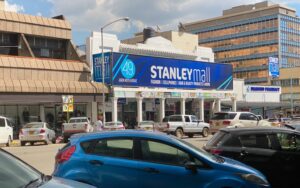
The grocery retail and wholesale sectors are low-hanging fruits, easy to start, simple to operate and do not require a huge initial outlay or much formal education, but for a local vendor in the streets starting one has been a nightmare.
An investigation, conducted in partnership with the Information Development Trust (IDT), revealed that foreigners who must not be allowed to operate in wholesaling and retailing trade have invaded the sector having been allocated space by authorities fraudulently and allegedly out of ignorance of the law.
The investigation also exposed collusion by representatives of the involved foreign countries who either claimed to be unaware of the regulations, refused responsibility for their citizens’ activities or claimed they presumed that their citizens had become naturalised Zimbabwean citizens on account of their having been in the country for many years.
Approached to respond to the development, responsible Zimbabwean authorities threw blame at each other with some pleading ignorance of the law while others blamed locals for not claiming their territory and watching as foreigners took up their spaces in the economy.
Moses Mhike, the Permanent Secretary of the Ministry of Women Affairs, Community, Small and Medium Enterprises Development passed the buck on the parent Industry and Commerce ministry who he said was looking into the issue.
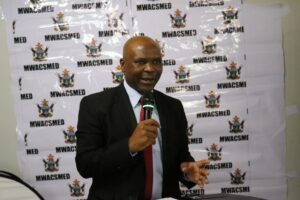
Moses Mhike“The matter is being handled by the ministry of industry and commerce who superintend over the Indigenisation and Economic Empowerment Act which prescribes the sectors which are reserved for locals,” Mhike said.
The 2021 Micro, Small and Medium Enterprises (MSMEs) survey conducted by Zimstat indicated that there are 4.2 million individuals operating 3.4 Million MSMEs in the country.
Approximately 4.8 million persons were engaged on a full-time basis in the MSMEs sector in 2021 and the estimated gross value added from MSMEs sector in 2021 was ZWL 522.2 billion.
Harare Mayor Jacob Mafume confirmed the ‘invasion’ of foreigners into the retail sector in the capital and said the local authorities were taking steps to correct the anomaly.
He however placed much blame for the development on politicians in the ruling Zanu PF party who he said were abusing political power to break the law in order to make money from monthly rentals that they charged for ‘stolen’ space.
“We are going to create a database and see which foreigners are occupying space they must not be.
“It is also illegal for a political party to give foreigners permission and protection to operate in reserved sectors while Zimbabweans are looking for employment,” Mafume said.
Zanu PF National Political Commissar Mike Bimha denied that his party was stealing any space and accommodating foreigners in prohibited sectors.
He said if any ‘comrades’ were doing it; they were doing so without the party’s knowledge or consent.
He instead pointed a finger at the local authority accusing them of failing to enforce the country’s laws.
“This means law enforcement agents are not working. What seems to be the problem is the local authorities who are complacent in the manner they are issuing operating licenses. We are calling for them to ensure the law is obeyed,” Bimha said.
But Bimha’s subordinate, the Zanu PF Harare Provincial political commissar, Kudakwashe Damson had more to say, including that he was not even aware of the existence of ZIDA, the law that makes it illegal to allocate trading space to foreigners in the retail sector. He also turned the tables saying that the locals had themselves to blame for not having trading spaces.
“Is there any local who came looking for a tuck shop and was denied? We have many locals operating business there. The shops were open to everyone and many shops were not occupied for a very long time because people were not coming. So this thing of saying they are only given to foreigners is a lie. Now people have seen that there is good business, they are now crying foul yet the shops were there for a long time struggling to get occupants. The locals were refusing to take up space saying business is low on that side,” he said.
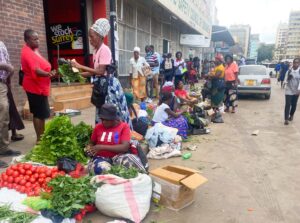
A survey conducted at Fourth Street bus terminus in Harare revealed that out of 25 tuck shops which were recently established there, only three are owned by locals with the remaining 22 belonging to foreigners.
The tuck shops at Fourth Street are constructed against the walls of the Zanu PF Harare provincial offices and it is here that shop space is obtained for substantial amounts of money.
That is despite the fact that all city space is the property of the local authority.
The ruling Zanu PF party has however declared many trading areas of their own, including lucrative trading areas such as Mbare’s Mupedzanhamo market and similar such markets in the CBD.
“It is very difficult to get a tuck shop to rent here because the guy who was given a contract to build these tuck shops is a foreigner and not Zimbabwean.
“So they agreed to share rentals nevakomana vekuseri uko (Zanu PF officials) and whenever there is vacant space it goes to a foreigner as they link each other,” said one tuck-shop attendant unaware he was speaking to a journalist.
Investigations also revealed that these foreigners would, after fraudulently obtaining ownership of the tuck shops, go on to sell or hire them out to desperate locals for exorbitant fees.
The prices charged by the foreigners selling these tuck shops are staggering.
A Tanzanian we approached pretending we wanted to buy said he wanted US$10 000 even without paperwork that would legalise ownership.
“Some are even selling the shop for US$10 000 and you will still be expected to pay rentals every month. Rentals range between US$700 and US$1000 per month,” a tuck shop attendant we spoke to said.
A Tanzanian tuck shop owner who identified himself only as Shadreck, said he was willing to sell his space to this journalist for US$10 000.
“If you have US$10 000 give me, imari shoma,” he said in not so fluent Shona.
One peculiarity about the row of tuck shops in Fourth Street is that none of them has a formal trading license that is issued by the Harare City Council.
They are deemed political properties and out of the city’s jurisdiction although this is clearly illegal.
According to the law, all land in and around the capital belongs to the Harare City Council.
“It is an unspoken agreement that no city council license inspector comes to check for licenses here. They know it (City of Harare) and they never come here. We just trade without licenses here,” said a local shop attendant working for a DRC citizen.
Very few foreigners operating tuck shops at the Fourth Street ‘mall’ employ local assistants. They man the shops themselves, which is what distinguishes the place as mostly foreign owned.
The few locals who work in these shops are often relegated to labour-intensive tasks such as carrying heavy bulky goods and there are paid measly wages.
“Kurembera kuri nani pane kudonha (half a loaf is better than nothing).
“If you are getting anything above US$100 per month then you are well paid,” said one Takudzwa, an employee of a Malawian shop owner.
Through more interactions it was also revealed that the Fourth Street tuck shop owners also do not pay tax and that, like it is with the city council, there is an unspoken agreement that Zimra does not send its taxmen there.
“These guys do not pay tax as the tuck shops are not properly registered and are not in any Zimra books. All these tuck shops are not in the City Council records either. They exist only in Zanu PF’s provincial records,” said one man who identified himself as William at the Zanu PF provincial offices.
Officials at Zanu PF provincial headquarters kept referring this publication to one Blessing Machenjedze who was said to be responsible for tuck shops. Efforts to meet him were however in vain as he kept saying he was busy and his number went unanswered all the time.
The Zimbabwe Revenue Authority (ZIMRA) head corporate affairs Francis Chimanda said ZIMRA could not comment on the tax status of these tuck shop owners because that was private and confidential information and disclosing individual information would be in breach of the ZIMRA Act.
“ZIMRA does not comment on the affairs of individual taxpayers as this constitutes a breach of their right to privacy and confidentiality as provided at law,” Chimanda said.
Meanwhile adjacent to these tuck shops, local vendors peddle similar wares out in the open on sidewalks, pavements and islands. They must brave the vagaries of the weather as they cannot afford to rent proper vending space.
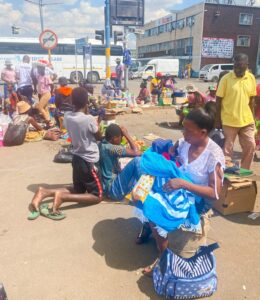
They are always running away from marauding city council police who chase them on the streets, arresting them and confiscating their wares.
Even as we were interviewing some of the vendors, a truckload of municipal police armed with baton sticks and tear gas arrived.
The vendors quickly gathered what they could of their wares before scattering away desperate to evade the authorities. There have been reports of fatal accidents as fleeing vendors got knocked down by vehicles on the busy streets.
Those that are caught are taken to Harare Central police station where they are made to pay fines but most of them said they usually paid bribes to the municipal police.
“I do not have enough money to rent a tuck shop; the rent is exorbitant so it is better for us to sell our stuff on the street. If you do not have money for bribes, trust me you can spend the whole year waiting to get a license,” said Brian Mutasa who was selling groceries packed in cardboard boxes along Fourth Street.
Some of the vendors bring their infants with them as they do not afford childcare and they juggle their responsibilities attending to customers and tending to their babies.
“There is no shade here to protect us from the rain or the sun. When it rains we cannot sell and when it is hot you just have to be here, imagine with a child on my back. This is affecting our social lives; you do not have enough time to spend with your family like what normal people do.
“I come here every day at 9 o’clock in the morning and I leave this place around 9 o’clock midnight. This is now my life. I do not have a job. I do not have anything else to do except vending,” said a woman identified as Lucia.
“Life is hard for a Zimbabwean. Getting an operating license is not easy as long as you do not have money. Yes we do not have money to rent these tuck shops but the government must give us free space to sell our wares,” said one vendor who refused to be named.
This publication also carried out a survey of tuck shops in other streets in the CBD and it showed that foreigners occupy a significantly big trading space in the retail and wholesale sector where they should not be.
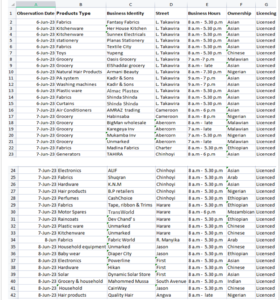
The investigation took us to three foreign embassies in Harare where we sought comment on our findings. Concerted efforts to reach the other embassies during the period of investigation were unfruitful.
The Pakistan ambassador to Zimbabwe, Murad Baseer said he was surprised and not happy that he was being asked to answer to activities that Pakistanis in Zimbabwe were engaged in saying that was none of his business.
He even threatened to sue if any of what was being discussed was published.
“That has nothing to do with us, ask the host country and the local authorities who give them licenses. It is out of my jurisdiction and responsibility. That has absolutely nothing to do with me,” the ambassador said.
He also accused this publication of trying to trigger xenophobic attacks upon his nationals.
“You also have your Zimbabweans in South Africa and you see how they are treated. Why do you want to tarnish a beautiful thing? Zimbabwe is a beautiful country and why do you want to tarnish that?
“Pakistanis have been here since independence and have contributed a lot to this country and why do you want to cause something bad?” he asked in anger adding: “And please don’t quote me at all in whatever you want to write. I don’t want to be part of this controversy.”
Prior to the meeting, another woman from the embassy had also threatened to sue us if we wrote anything about the Pakistanis and their presence in the prohibited retail sector.
Indian Ambassador to Zimbabwe Vijay Khanduja said Indian nationals operating tuck shops in the CBD were now Zimbabwean citizens.
“Not everyone who comes to Zimbabwe finds employment,” he said.
“So they are into business. They are now Zimbabweans, 80% of Indians in Zimbabwe have citizenship. They have been here for generations and most of them are now locals. Indians have been here from very ancient years and we are talking about four to five generations,”
Ms Xiong Nengzi who is in charge of the media from the Chinese Embassy said she was not aware of the issue of Chinese nationals doing business in the retail sector in Zimbabwe.
“Good afternoon madam, the Embassy has no idea about this issue, and we kindly recommend you to ask the relevant government department of Zimbabwe or Harare city about that. We will also bring this issue up with your chief editor then, thank you,” she said in a WhatsApp response to questions from this publication.
This story was co- published by NewZimbabwe.com working in collaboration with IDT


Comments are closed.